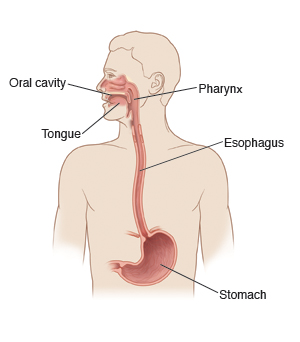What Is Esophageal Cancer?
There are actually two forms of esophageal cancer. Firstly, we have Squamous Cell Carcinoma which begins in the cells lining the esophagus. Then there is Adenocarcinoma which is found in the cells that create and release mucus and other fluids. Esophageal Cancer forms in tissues lining the esophagus (the tube through which food passes from the throat to the stomach).
Stage I. The cancer is found in the top layers of the cells lining the esophagus.
Stage II. This means that the cancer is in the deeper layers lining the esophagus. In some cases, it may have spread to the local lymph nodes.
Stage III. This is where cancer has breached the wall of the esophagus but has not spread to other parts of the body.
Stage IV. At stage four, cancer will have now spread to other parts of the body such as the lungs, liver, brain or bones.
What Are The Symptoms Of Esophageal Cancer?
During the early stages of esophageal cancer there may not be any symptoms, but as the cancer multiplies, symptoms may include:
- Difficulty or pain when swallowing
- You experience severe weight loss
- Coughing up blood
- Pain in the throat or back, behind the breastbone and/or between the shoulder blades.
- You may experience vomiting
- A chronic cough or hoarse voice
Causes and Risk Factors for Esophageal Cancer
- Age – Most cases occur with those who are over 55, so the older you are, the more you are at risk.
- Gender – Men are three times more likely to get esophageal cancer than women are.
- Reflux or GERD – Those who suffer from this condition have a higher risk.
- Barrett Esophagus – Those who suffer from Barrett Esophagus are more at risk.
- Weight – Obese people are more likely to get esophageal cancer.
- Alcohol and Smoking – Both are major risk factors.
- Workplace exposures – People who come into contact with chemicals in the workplace are more at risk.
- Human Papilloma Virus
Recommended Treatments for Esophageal Cancer
For further information on available treatments, please see our recommended esophageal cancer treatment page.
